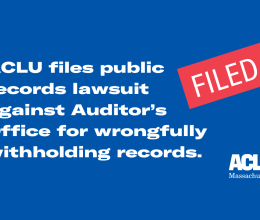
The Massachusetts State Senate today released legislation to reform the Massachusetts public records law and announced a vote on the subject next week. Open government groups, which comprise the steering committee of the Massachusetts Freedom of Information Alliance, lauded the reform and called for swift passage. The new bill, released by the Senate Ways and Means Committee today, follows passage of a much weaker bill in the House of Representative last November.
The proposed legislation would give courts the ability to enforce the law by awarding attorney fees to those wrongly denied access to public records, which would bring Massachusetts in line with forty-seven other states. It would set strict limits on how much government agencies can charge for public record information, and would set reasonable time-frames for responses to public records requests.
"They really got it right," said Carol Rose, executive director of the ACLU of Massachusetts. "These are the practical, tested reforms that are needed to make the law more than just empty words on a page. We've described the current law as a flashlight without working batteries. This proposal from the Senate would recharge it by improving enforcement and affordability. The Senate President and Chairwoman Spilka deserve a lot of credit for putting out an excellent piece of legislation, and we hope they'll fight to keep it strong."
By taking up this legislation, the legislature is responding to widespread criticism that the Massachusetts public records law is among the weakest in the country and routinely flouted by public officials. In November, the Center for Public Integrity released a report that gave the Commonwealth an F grade on public access to government information for the second time in a row.
"The Senate bill is very strong," said Pam Wilmot, executive director of Common Cause Massachusetts. "It will accomplish the goals we have been fighting for such as reining in outrageous charges for public records and putting needed teeth into enforcement of the law. If passed as is, Massachusetts will no longer have one of the worst public records laws in the country. But it is critical that the bill not get watered down on the floor or in conference committee."
Dozens of organizations have advocated for comprehensive public records law reform this year, contending that the law is weak and needs updating for the digital age, having not been substantially amended since 1973.
"With this bill, the Senate has shown that it takes seriously the importance of reforming our public records law," said Bob Ambrogi, executive director of the Massachusetts Newspaper Publishers Association. "This bill would significantly enhance the ability of citizens and journalists to obtain records on a timely basis at a reasonable cost and to enforce their rights when they are wrongfully denied access to public records."
"This Senate bill will help restore respectability to our public records law," said Justin Silverman from the New England First Amendment Coalition. "It will make it easier for residents to obtain information in a timely, cost-efficient way. It will provide recourse for those who are unjustly denied information and help keep communities informed. This legislation is a big step toward returning transparency to Massachusetts."
The proposed legislation would not alter the scope of the public records law or make any changes to existing exemptions. Rather it would modernize outmoded language in the law, strengthen procedures for compliance and enforcement, and make other changes.
Specifically, the legislation would:
- Require courts to award attorneys' fees when access to public records is wrongly denied.
- Limit to $25/hour the fees municipalities and state agencies can charge for time spent responding to requests.
- Limit charges for time spent to review and withhold information from the public, permitting such charges only for information that is required to be withheld by statute (for example, medical information under the Health Insurance Portability and Accountability Act (HIPAA)).
- Provide for reasonable response times for records requests. The proposed legislation would require agencies to substantively respond within 10 days, and to fully comply within 15 days of the initial request, or 30 days for more complicated matters. If additional time is needed, agencies and municipalities may petition to the supervisor of public records for an additional 30 day extension.
- Direct agencies to assign a "records access officer" to streamline responses to public records requests.
- Require agencies and municipalities to make electronic documents available in electronic form.
FOR FURTHER INFORMATION, CONTACT:
- Gavi Wolfe, Legislative Counsel American Civil Liberties Union of Massachusetts (617) 482-3170 x340; gwolfe@aclum.org
- Pam Wilmot, Executive Director Common Cause Massachusetts (617) 962-0034; pwilmot@commoncause.org
- Robert J. Ambrogi, Executive Director Massachusetts Newspaper Publishers Association (978) 309-9188; ambrogi@legaline.com
- Justin Silverman, Executive Director New England First Amendment Coalition (774) 244-2365; justin@nefirstamendment.org






